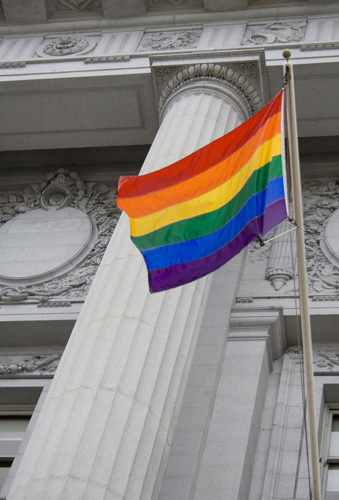 Now that our neighbors to the north have legalized same-sex marriage with Referendum 74, supporters hope Oregon will do the same on the next ballot in November 2014. The economic impact to Oregon could number in the millions.
Now that our neighbors to the north have legalized same-sex marriage with Referendum 74, supporters hope Oregon will do the same on the next ballot in November 2014. The economic impact to Oregon could number in the millions.
BY EMMA HALL
 The Williams Institute of UCLA Law recently released a report estimating the economic impact in the three newest states to approve gay marriage — Maine, Maryland and Washington. Massachusetts was the first state to legalize same-sex unions in 2004. From May 2004 to September 2008, the state had a $111 million boost from gay marriage legalization, according to an earlier report by The Williams Institute.
The Williams Institute of UCLA Law recently released a report estimating the economic impact in the three newest states to approve gay marriage — Maine, Maryland and Washington. Massachusetts was the first state to legalize same-sex unions in 2004. From May 2004 to September 2008, the state had a $111 million boost from gay marriage legalization, according to an earlier report by The Williams Institute.
The report predicts that wedding spending in the next three years in those states could generate over $166 million. Washington same-sex couples make up an $88 million chunk of that, with a $57 million boost expected in the first year alone. The impact would be felt especially at wedding and tourism-related businesses.
The Williams Institute findings are based on 2010 U.S. Census data and Washington’s average wedding spending. It also assumes that half of Washington’s existing same-sex couples will marry in three years, based on the rate of marriage after same-sex marriage was legalized in Massachusetts. Estimates don’t include the myriad of out-of-state same-sex couples that might travel to Washington to get married when they don’t have the opportunity in their home states—including couples from Oregon.
The effects of same-sex marriage legalization are already being felt in Washington, even though it has only been a little over a month since the law went into effect on Dec. 6, 2012. Over 130 gay couples were married at Seattle City Hall on the first day alone.
Though Washington’s same-sex marriage legalization is still in infant stages, the biggest boost to the economy is expected in the first year. By the end of 2013 it should become clearer if Oregon voters will follow suit.
Basic Rights Oregon will be collecting signatures for a 2014 measure this summer. The organization needs to collect 116,284 signatures to qualify for the ballot. Basic Rights Oregon decided not to pursue a ballot measure in 2012, because the “timing wasn’t right.” Oregon faces a harder fight than Washington, which voted for a statute change. To legalize same-sex marriage, Oregon voters would have to overturn a constitutional ban that was previously voted in—the 2004 constitutional amendment Measure 36 that prohibits gay marriage. Although nine states currently allow same-sex marriage, Oregon would be the first to overturn a constitutional ban if Basic Rights Oregon is successful.
Currently, Oregon does have domestic partnerships (approved by the Legislature in 2007), but supporters want full equal rights, and think that 2014 could be the time as more politicans rally behind the cause. President Obama is the first sitting president to declare his support for gay marriage and there are many openly gay prominent figures in government (such as House Speaker Tina Kotek, the first openly lesbian house speaker). However, some supporters think 2014 would be a bad time to bring the controversial choice to voters, as non-presidential elections generally have lower voter turnout, as well as a lower turnout of young, liberal voters.
As Oregon’s economy remains stagnant with unemployment at 8.4%, it remains to be seen if the $88 million spending boost in Washington will sway some of the 57% of Oregon voters who opposed gay marriage in 2004.
Emma Hall is web editor for Oregon Business.

